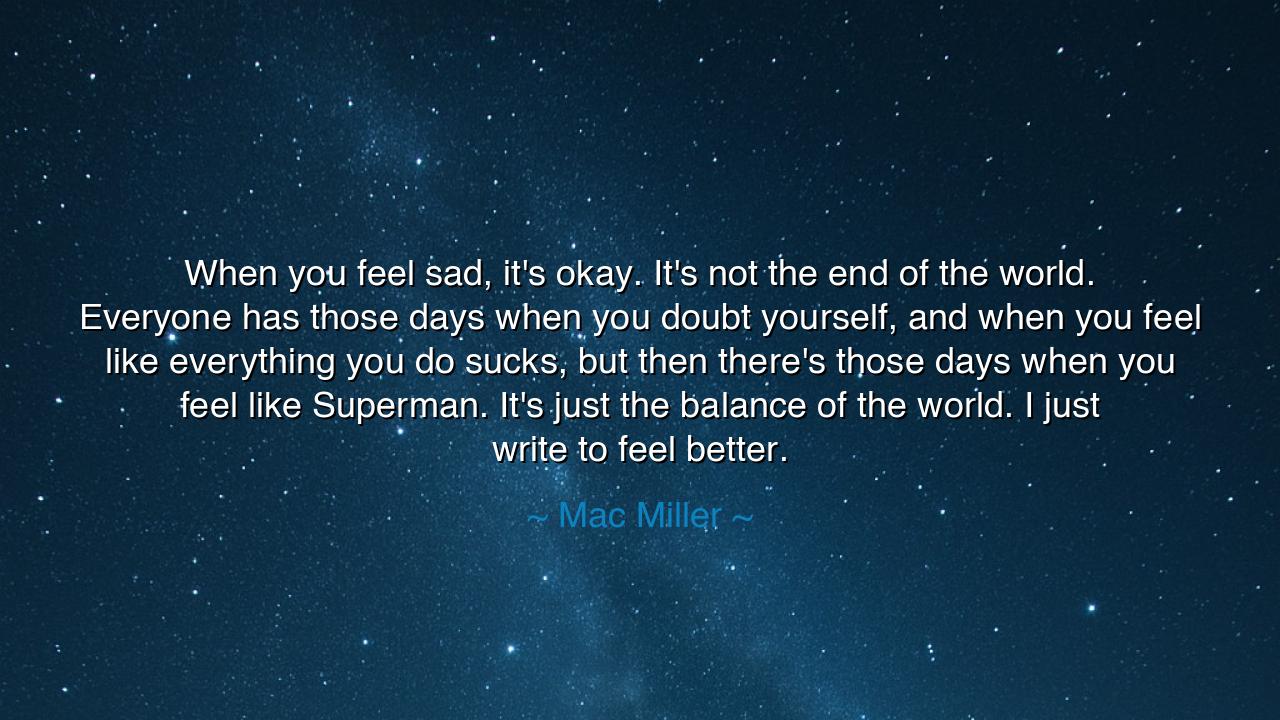
When you feel sad, it's okay. It's not the end of the world.
When you feel sad, it's okay. It's not the end of the world. Everyone has those days when you doubt yourself, and when you feel like everything you do sucks, but then there's those days when you feel like Superman. It's just the balance of the world. I just write to feel better.






In the gentle, reflective words of Mac Miller, there shines a truth that belongs not only to the artist, but to the human soul itself: “When you feel sad, it's okay. It's not the end of the world. Everyone has those days when you doubt yourself, and when you feel like everything you do sucks, but then there's those days when you feel like Superman. It's just the balance of the world. I just write to feel better.” Within these words lives the rhythm of life itself — the eternal pulse of rise and fall, joy and despair, shadow and light. Miller, who walked the fragile line between genius and vulnerability, reminds us that the balance of the world is not found in perfection, but in the acceptance of both pain and healing.
The origin of this quote lies in Mac Miller’s reflections on his own battles with mental health, creativity, and the weight of fame. Beneath the music and the energy of his art was a heart deeply aware of the world’s impermanence — of how swiftly happiness turns to melancholy, and how both emotions are sacred teachers. To him, sadness was not an enemy to flee, but a passing tide in the ocean of existence. Through writing and music, he found solace — a way to translate the chaos of emotion into art, to transform pain into beauty. His words are both confession and comfort: even in despair, creation can be an act of survival.
The ancients understood this cycle as well. The philosopher Heraclitus wrote, “The road up and the road down are one and the same.” He taught that all things flow, that opposites coexist in harmony — life and death, night and dawn, sorrow and joy. In this same spirit, Miller speaks to a generation often crushed by the illusion that one must always be happy. His wisdom dismantles that falsehood: to be human is to feel deeply, to rise and fall without shame. As the Stoics once taught, pain cannot be avoided, but it can be understood — and through understanding, one may find peace.
Consider, too, the life of Vincent van Gogh, the painter whose sorrow was both his torment and his muse. In his letters, he wrote of days when he felt useless and despised, when the world seemed hollow. Yet, in those same days, he painted — sunflowers, stars, fields of gold. His sadness did not destroy his art; it became his art. So too with Mac Miller, who turned doubt into melody, loneliness into verse. Both men understood that creation is the soul’s rebellion against despair, and that expression is how one survives the storms within.
When Miller says, “It's okay,” he speaks as a healer would — reminding us that sadness is not weakness but evidence of life’s depth. To feel sorrow is to be awake to beauty, to loss, to longing. To feel joy afterward is to know gratitude. Both are sacred halves of the same whole. Without sadness, joy would have no meaning; without struggle, triumph would have no light. The balance of the world, as he calls it, is this divine tension between despair and delight — the endless motion that shapes every human story.
Yet there is also quiet courage in his words. When he admits, “I just write to feel better,” he reveals a path that anyone may follow: the path of expression as healing. Whether through art, conversation, prayer, or silence, the act of releasing emotion transforms pain into purpose. The poet writes, the craftsman builds, the gardener plants — each transforms sorrow into something enduring. This is the wisdom of creation: not to erase feeling, but to give it form. In that way, we not only survive sadness — we transmute it.
The lesson, then, is both simple and profound: accept your sadness, honor your emotions, and create through them. When you feel broken, do not hide. When you doubt yourself, remember that even heroes stumble before they rise. Life moves in cycles, and every low is followed by ascent. The world is not cruel for giving us both sorrow and joy; it is merciful, for in their alternation, it teaches balance.
So let these words of Mac Miller echo through generations as both balm and blessing. When you are sad, breathe deeply — it is not the end of the world. When you are joyful, savor it — for it too will pass. And in all things, find a way to create, to give your feelings a voice. For in expression lies redemption, and in balance lies peace. This is the eternal rhythm of existence — the music of the soul — where even in sadness, one may still find the quiet strength to sing.






AAdministratorAdministrator
Welcome, honored guests. Please leave a comment, we will respond soon